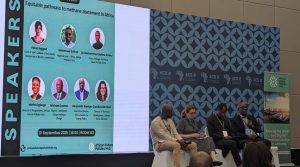Earlier this month, the Global Methane Hub attended Africa Climate Week and the Africa Climate Summit, joining government leaders, scientists, industry innovators, and climate champions working toward bold climate action across the continent.
The Global Methane Hub’s Regional Lead for Africa, Mohamed Alimou Sultan, was on the ground participating in events and conversations focused on shaping a unified African stance ahead of COP30, tackling debt and the cost of capital, advancing adaptation finance, and showcasing African-led solutions to tackle the climate crisis.

On September 5, Mohamed participated in a panel discussion during the United Nations Framework Convention on Climate Change Mitigation Work Programme Session (UNFCCC) alongside the African Development Bank, C40, the Environmental Defense Fund, and several Chinese and Indian think tanks focused on identifying financial pathways for waste mitigation under the UNFCCC’s working group. The session underscored that waste, one of the three sectors we can decrease methane emissions in, is a powerful entry point for social and economic benefits – creating jobs, advancing gender equity, and building circular economies that reduce poverty. Speakers emphasized that solutions must be bottom-up and respect national priorities, in line with the principle of Common but Differentiated Responsibilities.
On September 10, in partnership with African Future Policies Hub, the Global Methane Hub co-hosted the Equitable Pathways to Methane Abatement in Africa event at the Africa Climate Summit. This reflected a broader theme of the Summit: shifting perspective and action from Africa as “risk” to Africa as “opportunity” and ensuring that trade, agriculture, and energy transitions are designed equitably to unlock investment, development gains, as well as having clear climate impacts.
During the event, Mohamed stressed the importance of aligning finance with Africa’s economic strengths, saying, “the best climate finance strategy for Africa is its dynamic economies. A domestically led African Trade Decarbonisation Fund could step in as a practical tool to finance African countries’ ability to meet the expanding set of climate trade-related regulations. Notably this includes supporting traceability, abatement technologies and operational improvements, among others.”
In parallel, Mohamed engaged in several discussions on the role of country platforms: government-led mechanisms meant to incentivize domestic coordination to align priorities with public and private financing to accelerate action at the nexus of climate and development. Rather than creating new structures, these platforms build on existing national systems to remove bureaucratic barriers, increase transparency, and give investors greater confidence. This is particularly relevant to the Global Methane Hub’s work with the Africa Climate Foundation on methane-focused country platforms in Senegal and Nigeria, which could help structure investment pipelines and make climate development goals more investable. The broader takeaway from these conversations was that cooperation through platforms is important, but turning cooperation into capital will require more innovative approaches that directly connect methane abatement and other climate priorities with Africa’s economic growth trajectory.
The Africa Climate Summit sent a powerful signal, that uniting political will and focusing on solutions, and anchoring these in greater local and international accountability are necessary to create genuine African ownership of transformative green growth investments. Gatherings like these are a reminder that when we come together across communities, governments, and industries, we can move climate action forward in a way that’s meaningful for Africa and for the world.